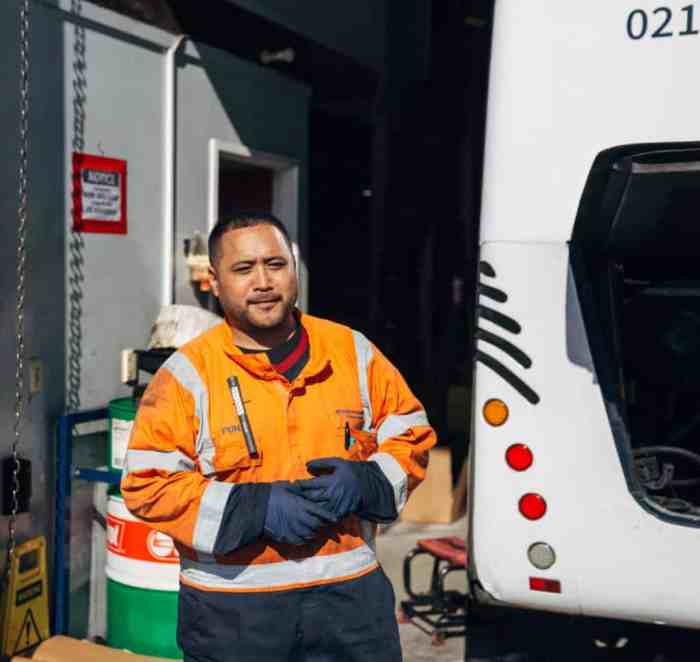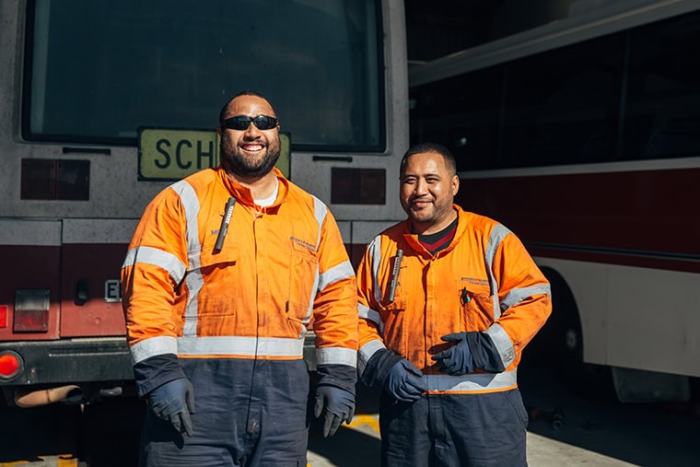A summer’s work experience in a busy bus workshop has been the key to a brighter future for good mates Kamosi Finau and Puna Taruia. Find out how these automotive trainees turned work experience into apprenticeships – and how you can do it too.
Talking to an employer can be scary, but it’s one of the best ways to get your foot in the door. Just ask Kamosi and Puna, whose introduction to an automotive employer led to a job over summer – and an apprenticeship offer.
The pair showed up for work experience at Ritchies Murphy Transport Solutions in Takanini during their last term of study at Manukau Institute of Technology. Thanks to their hard work and keen attitude, they made an impression on the workshop manager, Dave Robb (pictured with Kamosi and Puna above).
“I brought in half a dozen students for an introduction to a real engineering worksite,” says Dave, who manages four apprentices and 12 senior staff in the workshop and panel shop, maintaining and repairing a fleet of 160 buses and 40 cars.
“Some of the students were a bit cocky and some didn’t seem interested. But these two were writing things down and really taking notice,” says Dave.
“It’s about attitude in this game — you don’t have to know anything, you just have to be really keen to learn.”
Putting yourself forward
Fronting up to an employer is really worth doing, even if you feel scared or whakamā (shy).
“Just knock on the door and offer to sweep the floor,” says Dave. “Work experience gives you an idea of what you want to do and gives you the inside running when a job comes up.”
Although they were lucky enough to meet Dave through the course, Puna says approaching employers for work experience takes courage, “especially if you’re a bit shy like me!”. But putting yourself out there shows the employer you’ll be willing to put in effort on the job.
And once you’re in the door, you can show your enthusiasm by keeping busy, says Kamosi.
“Work experience is your chance to get on board and show you’re keen.”
“You can never stand there with your hands in your pockets. You’ve got to always be watching the tools and the ways of doing things.”
Getting started

Puna, 29, grew up with a love for cars — fixing and modifying them in the family garage in Mangere. The Taruia family whakapapa to Niue on his mother’s side and Cook Islands on his father’s. Puna has a sister, and two brothers who are qualified tradies.
He’d been working for seven years as a process worker in a food industry factory and, with his family’s support, he decided to “step up to better things and get qualified”. He started with a NZ Certificate in Automotive Engineering (Level 3) at MIT with help from an MPTT scholarship, which is how he met Mosi.

Kamosi Finau, 30, is a married father of a 14-year-old son and three girls aged 11, 5 and 2. Mosi was born and raised in Otara and his family come from Tonga, where they usually try to visit every couple of years.
Having been forklift driving and loading trucks at Foodstuffs for 10 years, Kamosi decided to make a change.
“My father-in-law is a mechanic and he was pushing me to think about a career. I didn’t know much about mechanics, but I enrolled at MIT and things just opened up for me.”
A foot in the door
After laying the groundwork with unpaid experience during their last term at MIT, Puna and Mosi applied for paid work experience at Ritchies over the summer holidays.
“We thought we’d give them both a go,” says Dave. “They started off cleaning dirt from the roofs of the buses. And they turned out to be so keen and useful we buddied them up with a mechanic and extended their paid work experience by three weeks.
“Now — and they weren’t expecting this — we’ve just offered them both apprenticeships,” says Dave.
“We were only looking for one apprentice, but they’re both good blokes and they seem to like being here, so we’ve bought them a toolbox each and look forward to having them around.”

Puna says getting an email from the chief executive, Todd Murphy, was a huge boost.
“It just gave me massive confidence to know I’m in a job with a future, getting great training and learning work practices from the old boys.”
Dave says he’s always keen to meet enthusiastic learners, and encourages trainees to introduce themselves to potential employers.
“I might be a bit old-school and my approach takes a bit of courage, but I reckon if you front up and knock on the door of a place you want to work, you’ll nearly always get listened to.
“People can see your character when you look them in the eye. It’s a whole lot more effective than sitting behind a computer and answering a whole lot of ads. It gets your foot in the door.”
Work experience helps you get your foot in the door and learn heaps about your trade – and many employers won’t hire you without it. Find out more about how to get work experience.
Make your mark
Work experience is essential for building your skills and adds valuable trades experience to your CV. In fact, a lot of employers won’t hire someone who hasn’t done work experience. Check out these tips on how to land this work and make a good impression on your boss.
- It’s normal to be scared to talk to an employer, but knocking on their door is well worth the effort. It shows initiative and a positive attitude, which is exactly what employers are looking for.
- To help you feel more confident approaching an employer, do a bit of research by checking out the company’s website and talk to your navigator for advice.
- When you show up for work experience, bring a small notepad and pen and take notes on what your boss says. This shows you’re keen to be there and will help you remember what you learn.
- Ask questions. This shows you’re paying attention and want to learn more. Remember, employers don’t expect you to know much when you’re starting out. Instead, they’re looking for enthusiastic workers who value the chance to be there.















